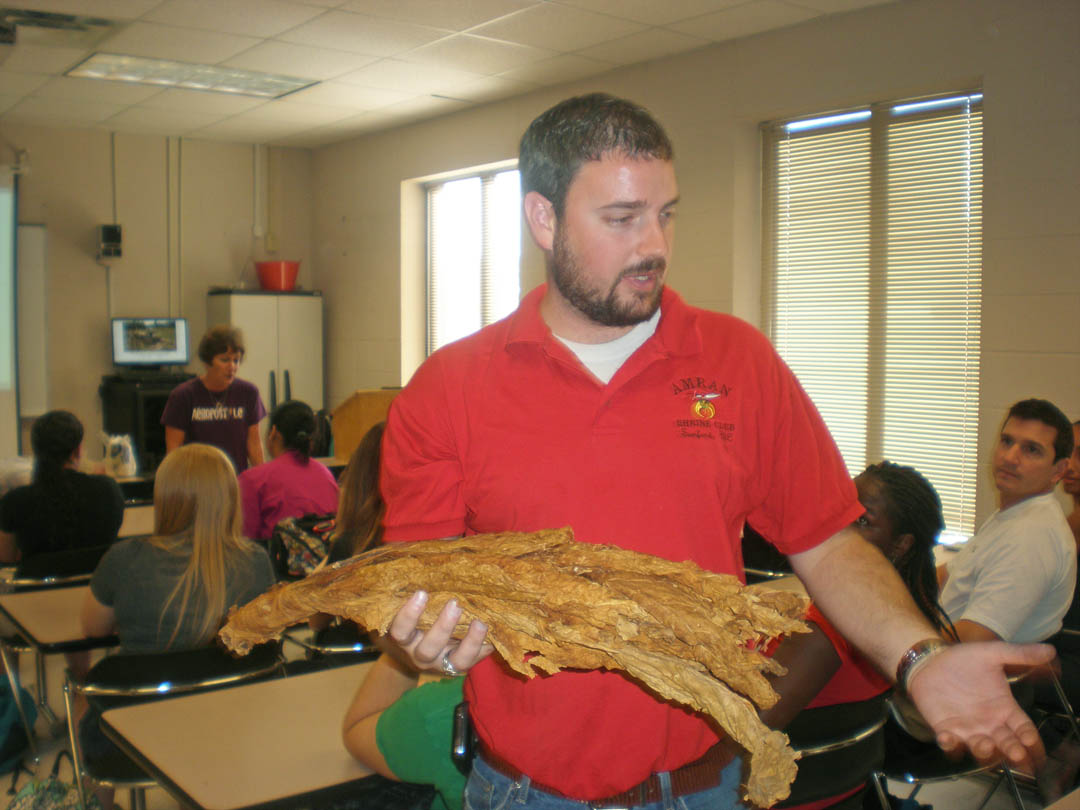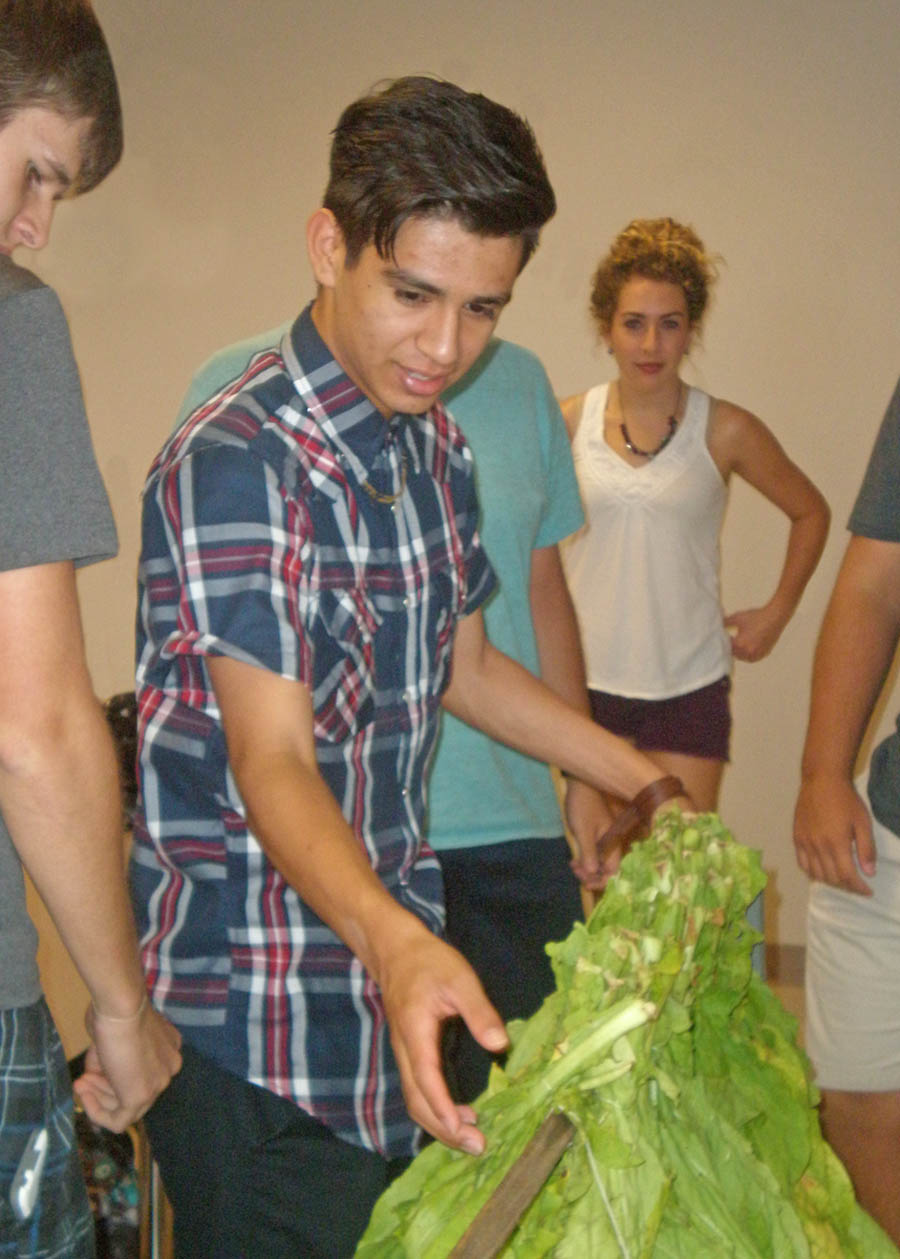College News
CCCC history students learn about tobacco farming
Notice: This article is older than 12 months. Names, contact information, programs, titles, etc. might have changed. If you have any problems please call the main college number, 1-800-682-8353, and we will be happy to direct you accordingly.

click image to enlarge ⊗
Patrick Kelly grew up on a local tobacco farm and now works at Central Carolina Community College ... (more)

click image to enlarge ⊗
Juan Penaloza (center), a student in Central Carolina Community College instructor Bianka Stumpf's ... (more)
09.15.2014 • Admin, Faculty & Staff • College & Community • College General • Students/Graduates
SANFORD - For decades, tobacco flourished as the South's No. 1 cash crop. Even though the popularity of cigarettes began to dwindle in the 1960s, demand for domestically grown tobacco is still great enough to support a number of large farmers throughout the South.
The names Harrington, Kelly and Thomas represent big tobacco production in Lee County. Patrick Kelly and his aunt, Kay Kelly, represent two sets of local Kelly family farmers. They recently spoke to an American history class at Central Carolina Community College about the art of growing tobacco.
CCCC instructor Bianka Stumpf's American history class is studying the 13 colonies where, before cotton was king in the 19th century, tobacco was king. Tobacco was exported in significant quantities to Europe in the 17th century. In lecture and discussion during the first few weeks of the semester, Stumpf said the students have examined the role of agriculture and some of the realities of farm life for the early American settlers in Virginia and North Carolina.
"Given North Carolina's deep roots in tobacco, I thought inviting tobacco farmers would allow students to experience something with historical and local relevance," Stumpf said. "Few students have direct ties to farming as in previous generations. Since so much of the early American story is agricultural, it was a treat to have Patrick, a former history student of mine, and his Aunt Kay come to class. They were candid, shared many photographs of the cultivation process, demonstrated tobacco tying and looping, and answered a host of questions from students, many of whom knew little about farming."
Raised in the tobacco growing tradition, Patrick Kelly, who is CCCC's coordinator of Student Outreach and Partnerships, worked in tobacco almost from infancy. As a young boy, he helped pull weeds from the field. As he got older, Patrick sat on the tobacco setter and learned how to "prime" or harvest tobacco, along with many other tasks. The toughest job he said he ever had working in tobacco was walking behind the tobacco setter to make sure that none of the plants failed to be planted.
"If a plant was missed, you had to stop, dig a hole and replace it manually. This had to be done throughout the whole field," Patrick told the class.
Kelly's parents, who worked for the Lee County School System during the day, often worked long into the night setting and fertilizing the plants. Then, there was topping, suckering, looping and curing the tobacco, the majority of which was done by hand on the Kelly Farms.
"Growing up on a tobacco farm was hard work," Patrick said. "There were chores to be done before and after school and all day during the summer. We didn't take a vacation until the finished product was taken to market and only the stalks remained in the field."
As Patrick and Kay reflected on the work they did growing up on a tobacco farm, they both expressed their gratitude for the strong work ethic instilled in them at an early age. Kay, who has eight other siblings, demonstrated how she and her brothers and sisters looped the tobacco to a stick for curing, a long and arduous job.
"That's all we knew was raising tobacco," said Kay, who went on to become a nurse and work at Rex Hospital, in Raleigh, as well as for the Lee County School System.
Kelly Farms has been farming tobacco for more than 50 years and is proud of the rich tradition they share.
"The best sight for a tobacco farmer is a field of tobacco with plants six feet tall, good and green, with big, healthy leaves," said Patrick. "The biggest leaves with the most weight bring the most money per pound."
For information about Central Carolina Community College and its programs, visit its website, www.cccc.edu or call the college at 919-775-5401.
Categories
- Admin, Faculty & Staff Category
- Arts & Entertainment Category
- Clubs Category
- College & Community Category
- College General Category
- Continuing Education Category
- Curriculum Programs Category
- Distance Education Programs Category
- Facilities/Buildings Category
- Finances Category
- Foundation Category
- Graduations Category
- Lee Early College Category
- NCCCS Category
- SGA Category
- Special Events Category
- Sports Category
- Students/Graduates Category
- Uncategorized Category
Archives

